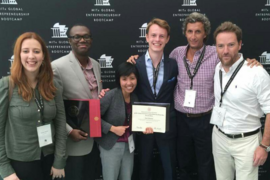A few years ago, a young engineer named Yen Pei Tay enrolled in MIT’s Global Entrepreneurship Bootcamp. He had taken the Entrepreneurship 101 and 102 massive open online courses (MOOCs) through MITx and was ready to test an idea for a new digital platform.
He had already created a technology that would enable individual mobile users to sell their unused data directly to other users, but was struggling to bring his platform to market.
“I came to MIT to validate the concept of Wi-Fi sharing, leveraging the same technology that we had built,” Tay says. “At the bootcamp, with feedback from mentors and investors, we got a real reboot.”
That reboot, which involved a shift away from business users and toward individual consumers, resulted in an app called Simplify, which was first introduced on the Google Play store last August.
Exceeding all expectations, Simplify has just been named by Fast Company magazine as one of the world’s 50 Most Innovative Companies for 2017.
Fast Company creates this list by surveying thousands of enterprises across the globe. It identifies the most notable innovations and traces their impact on business, industry, and the larger culture. In this year’s rankings, Tay’s small startup was listed alongside global tech giants like Apple, Amazon, Google, and Netflix.
“This achievement has been remarkable to us, given that we are a very young company,” Tay says.
He credits the Global Entrepreneurship Bootcamp, and its strong alumni network, as key to his success in business. “The high-quality engagement and dedicated support rendered from this MIT fraternity is the most valuable thing to add to our entrepreneurial journey,” he says.
While Simplify’s progression from concept to market has been unusually fast, in many ways, Tay’s story follows a familiar plotline. MIT’s six-day, intensive Global Entrepreneurship Bootcamp was created to support visionaries like Tay, who are poised to make a breakthrough and need just a little help and support from peers.
“You have to work with other people face to face, at least initially, to really understand how to apply the concepts for a specific new opportunity,” says Bill Aullet, managing director of the Martin Trust Center for MIT Entrepreneurship, senior lecturer at the MIT Sloan School of Management, and a member of the bootcamp faculty. “In entrepreneurship, every good opportunity is a new one. It is one that has never been done before. That is the point of innovation.”
Tay’s next big idea, the launch of a Simplify drone to provide internet hotspots on-demand, could be even more revolutionary than the creation of a sharing economy for mobile broadband. “Instead of chasing a Wi-Fi signal, he says, “why can’t we let the Internet come to the people?”
It is the kind of question you might hear at the next bootcamp — to be held March 26-31 at Queensland University of Technology in Brisbane, Australia.
To learn more about how MIT Entrepreneurship Bootcamps can shape your future, visit bootcamp.mit.edu/entrepreneurship.









